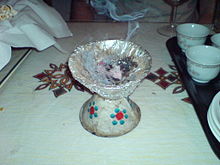- Culture of Eritrea
-
The culture of Eritrea has been largely shaped by its location on the Red Sea coast, as well as the area's historic links with Ethiopia, Somalia, Djibouti, Sudan, the Near East and Italy. The local culture consists of various, and often quite similar, traditions practiced by the nation's many Cushitic and Semitic-speaking Afro-Asiatic ethnic groups, in addition to those practiced by the area's Nilotic minorities. Eritrea's semi-arid terrain in the northeastern Sahel and its unique climate have also been important influences on local customs.
Contents
Coffee ceremony
One of the most recognizable parts of Eritrean culture is the coffee ceremony.[1] Coffee (Ge'ez ቡን būn) is offered when visiting friends, during festivities, or as a daily staple of life. If coffee is politely declined then most likely tea ("shai" ሻይ shahee) will be served. The coffee is brewed by first roasting the green coffee beans over hot coals gughin a brazier. Once the beans are roasted each participant is given an opportunity to sample the aromatic smoke by wafting it towards them. This is followed by the grinding of the beans, traditionally in a wooden mortar and pestle.
The coffee grounds are then put into a special vessel, called a jebena, and boiled. A jebena is usually made of clay and has a spherical base, a neck and pouring spout and a handle where the neck connects with the base. When the coffee boils up through the neck it is poured in and out of another container to cool it, and then is put back into the jebena until it happens again. To pour the coffee from the jebena a filter made from horsehair or other material is placed in the spout of the jebena to prevent the grounds from escaping.
The host pours the coffee for all participants by moving the tilted jebena over a tray with small, handleless cups (finjal) without stop until each cup is full. Some of the coffee will inevitably miss the cup but this is done to prevent the coffee grounds from contaminating the brew. One extra cup is poured each time. The grounds are brewed three times: the first round of coffee is called awel, the second kale'i and the third bereka ('to be blessed'). The coffee ceremony may also include burning of various traditional incense such as frankincense or gum arabic.
Cuisine
Main article: Eritrean cuisineTypically, Eritrean cuisine consists of various stews (tsebhi) made from vegetables and meat, and served atop a large, flat sourdough bread called injera or tayta. Many vegetarian dishes are available, since a majority of the population observe fasting at some time during the year. Eating is accomplished without utensils by tearing a piece of injera (strictly using the right hand), then scooping some stew, vegetables or salad with the bread.
On visiting an Eritrean household, it is polite to decline at least three times if asked to dine. Usually the host will say "bezay kelalem", after which the guest may agree to dine. This process ensures that one does not seem too eager to eat at another's household.
Music
Main article: Music of EritreaReligion
Main article: Religion in EritreaIt is estimated that 50% of the population of Eritrea is Christian, mostly belonging to the Oriental Orthodox tradition of the Eritrean Orthodox Tewahedo Church, and the other 50% is Sunni Muslim or Sufi.[2] The rest of the population practice traditional Indigenous religions, and Roman Catholic, while others include Protestants, Seventh Day Adventists, Jehovah's Witnesses, and Baháís.
Christianity
Christianity accounts for 50% of the population.[2]
Eritrea was one of the first Christian countries in the world along with its neighbour Ethiopia. With Ethiopia it was the first Christian African country turning Christian before most of Europe. Most Eritrean Christians are Orthodox but there is a large Catholic minority. There are also a few Protestants. Christianity is part of Eritrea's rich culture as most festivals during the year are based on the Christian calendar (excluding events like Independence Day). Eritrean Muslims and Christians have a mutual respect for each other.
Islam
Islam accounts for approximately 50% of the population.[2]
All Eritrean Muslims practice Sunni Muslim or Sufism. Generally, the eastern and western lowlands are predominantly Muslim while the highlands are predominantly Christian.
See also
References
- ^ It’s coffee time Network Africa Online, April 2008 interview.
- ^ a b c International Religious Freedom Report 2007: Eritrea. United States Bureau of Democracy, Human Rights and Labor (September 14, 2007). This article incorporates text from this source, which is in the public domain.
Culture of Africa Sovereign
states- Algeria
- Angola
- Benin
- Botswana
- Burkina Faso
- Burundi
- Cameroon
- Cape Verde
- Central African Republic
- Chad
- Comoros
- Democratic Republic of the Congo
- Republic of the Congo
- Côte d'Ivoire (Ivory Coast)
- Djibouti
- Egypt
- Equatorial Guinea
- Eritrea
- Ethiopia
- Gabon
- The Gambia
- Ghana
- Guinea
- Guinea-Bissau
- Kenya
- Lesotho
- Liberia
- Libya
- Madagascar
- Malawi
- Mali
- Mauritania
- Mauritius
- Morocco
- Mozambique
- Namibia
- Niger
- Nigeria
- Rwanda
- São Tomé and Príncipe
- Senegal
- Seychelles
- Sierra Leone
- Somalia
- South Africa
- South Sudan
- Sudan
- Swaziland
- Tanzania
- Togo
- Tunisia
- Uganda
- Zambia
- Zimbabwe
States with limited
recognition- Sahrawi Arab Democratic Republic
- Somaliland
Dependencies and
other territories- Canary Islands / Ceuta / Melilla / Plazas de soberanía (Spain)
- Madeira (Portugal)
- Mayotte / Réunion (France)
- Saint Helena / Ascension Island / Tristan da Cunha (United Kingdom)
- Western Sahara
 Eritrea topics
Eritrea topicsHistory Geography Politics Economy Agriculture · Energy · Tourism · Eritrean nakfa · Communications · Companies · Transport · Trade unions · HealthDemographics Culture Portal Categories:- Eritrean culture
Wikimedia Foundation. 2010.


